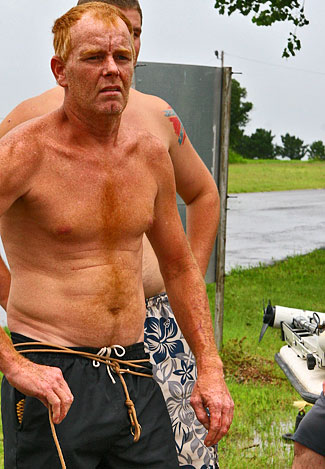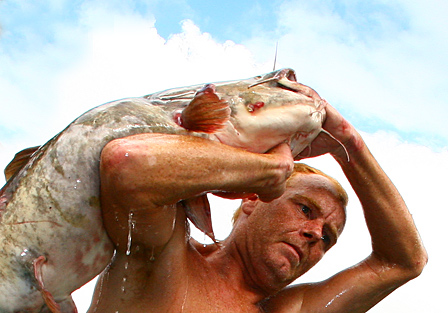-
 Fearless fish freaks
Fearless fish freaks
Anyone ever try this, those guys are some sick puppies!
The Fearless Fish Freaks
Floods and blood are just the start for Oklahoma's handfishermen
Updated: June 18, 2008, 10:59 AM ET
Editor's note: This is the first of a two-part story on the Okie Noodling tournament in Oklahoma at the end of June.
 James Overstreet
James Overstreet
Lee McFarlin is one of the legends of Oklahoma catfish noodlers. He will lead a team in search of the three largest flathead catfish they can catch while competing in the 24-hour Oklahoma Noodling Tournament.
The flathead catfish isn't merely ugly; it is grotesque, 15 or 45 or 75 pounds of mustachioed, bottom-dwelling bile, with beady eyes bugging out of the top of its face, lips like a deflated inner tube, and skin the color and consistency of refrigerated snot.
It is exactly the sort of creature that humans would leave in peace were it not built of a flaky, tangy flesh that tastes divine when battered and fried. A 50-pound flathead might carry 30 pounds of meat on its carcass, and it's simple to catch.
All you have to do is find one hunkered among some rocks or in an abandoned beaver's den or beneath a slab of submerged concrete. Then cram your hand into its craw, and when it sinks its teeny teeth by thousands down into your arm, friend, grab ahold inside the fish and steel yourself to fight your food.
'Get 'em out'
On the drive into Stillwater, Okla., the trees are flush with green, the grass is lush, and every river, creek and stream is swollen with cinnamon-colored water, the result of a month straight of rainy days in the wettest June ever recorded in Oklahoma.
Stillwater itself consists of a truly diverse collection of fast-food joints (the first Sonic Drive-In is here) and a gargantuan football stadium with a school called Oklahoma State University tucked somewhere in its shadow.
And a few blocks east and south of the old-brick downtown area, next to a shop that stockpiles giant restaurant signs on an asphalt pad, you might notice a crowd at the home of Lee McFarlin, hunter of deer, mixer of spices, plumber of plumbing, and hand-fisher of flathead catfish.
Among "noodlers" — hand-fishermen, also called "grapplers" elsewhere — few are as famous as McFarlin, and surely none are so accommodating to the media. That's why, on the soggy eve of the big Okie Noodling tournament on the last weekend of June, his yard is a thin grass soup full of people.
 James Overstreet
James Overstreet
Media giants such as National Geographic and The New York Times have chronicled the noodling exploits of Lee McFarlin.
In addition to McFarlin's friends and relatives, he's also hosting a three-person crew working on a show for the National Geographic Channel, a two-man documentary crew working on a follow-up to the 2001 film "Okie Noodling" and a pair of weary travelers from ESPNOutdoors.com. Because of viewers' (and, yes, readers') presumed thirst for all things weird, this outing has become spectacle, and if we're not careful, we're going to overexpose this formerly clandestine sport. So enjoy this story, dear reader, but do not tell anyone else in the world about it, or else noodling may not exist in even its current semi-raw state much longer.
NBC, rumored to be a part of this mission, doesn't show by the time McFarlin is ready to go, and McFarlin is ready to go right now, before the purple-grey sky opens up again. He's a wiry redhead with freckles dotting his torso and a tummy left over from before he dieted 50 pounds down to his current 170. "I tell you what," he says, eyeing the sky, cradling a 64-ounce plastic mug of tea, "it's gonna be get 'em and get 'em and get 'em out, boys."
 James Overstreet
James Overstreet
With more severe thunderstorms closing fast, Lee McFarlin knows that the show must go on. He looks over his shoulder to make sure the other boats in his party were ready to leave the boat ramp.
The crowd — a good 15 people — piles into trucks to head west out of Stillwater, past flooded pastures and busted levees that turn farmers' ponds into spillways. Upon arriving at Lake Carl Blackwell, the group adds a fisheries biologist named Dana Winkelman, who has conducted some of the scant research dedicated to the impact of noodling.
The men clamber down the submerged boat ramp to bob. "This is gonna be bad," someone says. The rain filled the lake and swelled creeks and burst a five-acre pond nearby, all of which are pushing into these waters. The lake level is about 4 feet higher than normal. A catfish hole that should be under chest-deep water is now 8 feet below the surface, and may be entombed in silt.
Water level is no small matter for noodlers. Higher water means an even greater disadvantage when they risk groping water moccasins, snapping turtles, muskrats and beavers, for a few. (Among those, the threat of beavers is most perilous.
 James Overstreet
James Overstreet
After stopping at the first fishing spot, McFarlin points to the exact place he wants to check for catfish.
McFarlin claims to have been called to a lake once to search for the body of a noodler who apparently disturbed a beaver several feet under water and was set upon as if he were a log. Skull-chomped, the poor man drowned.) It also increases the chances that structure — rocks, old roads, wood — may shift, pinning them beneath.
Then, it rains, yet again. The recent deluges have blessed some entrants in the noodling tournament with the chutzpah to ask for entry refunds. Brad Beesley, the filmmaker responsible for "Okie Noodling," assembled the tournament, believed to be the first of its kind, in part to have an ending for that documentary.
The rules for the 2007 tournament, the eighth annual, grant noodlers 24 hours before the 7:30 p.m. Saturday weigh-in to catch fish, with awards going to the biggest three-fish stringer and biggest single fish in "scuba" and "natural" divisions.

James Overstreet
Lee McFarlin pulls the behemoth to the surface.
Fish may come from anywhere in Oklahoma. Entrants from Missouri and Kansas will begin hitting holes as soon as they cross the state line on their way to Pauls Valley, a 6,000-person map-filler of Rockwellian quaintness an hour south of Oklahoma City. But with the waters as high as they are, few river noodlers are expected even to bring fish. Over their bellyaching, lake noodlers such as McFarlin have an advantage.
"You're talking about postponing it or canceling it," McFarlin says as he prepares to launch. "I'm like, 'You've got too much riding on it.'"
 Posting Permissions
Posting Permissions
- You may not post new threads
- You may not post replies
- You may not post attachments
- You may not edit your posts
-
Forum Rules
James Overstreet
James Overstreet
James Overstreet
James Overstreet





 Reply With Quote
Reply With Quote